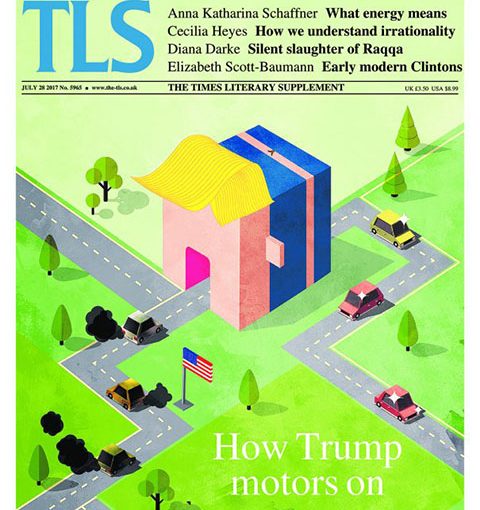On August 2, senior White House aide and notorious alt-right propagandist Stephen Miller came to the White House Press Room to discuss the RAISE Act, which would halve legal immigration into the U.S. In a heated exchange with Jim Acosta, a CNN anchor who quoted Emma Lazarus’s sonnet “The New Colussus” (“Give me your tired, your poor,/ Your huddled masses yearning to breathe free”), Miller attacked Acosta for his “cosmopolitan bias” and for asking about what the bill would do to the racial composition of immigrants to the US by claiming “that is one of the most outrageous, insulting, ignorant and foolish things said you’ve ever said.”
The use of the adjective “cosmopolitan” by right-wing polemicists has a long history, and this is why English writer Mathilde Blind’s life and career continues to speak to contemporary political realities. Gregory Tate emphasizes this in his 10 August 2017 review of Mathilde Blind: Late-Victorian Culture and the Woman of Letters for The Review of English Studies:
James Diedrick’s biography of the Victorian writer Mathilde Blind opens with a critique of Benjamin Disraeli’s 1872 speech on ‘Conservative and Liberal Principles’, in which Disraeli set out a stark opposition between the popular nationalism of his Conservative party and the elitist cosmopolitanism (or un-British radicalism) of Gladstone’s Liberals. For Diedrick, ‘this speech illuminates the reasons Blind’s career and writing mattered to her contemporaries, and why her story still speaks to contemporary cultural debates’ (p. 2). He argues persuasively that her life and career subvert Disraeli’s simplistic distinction between the national and the cosmopolitan. Born in Germany in 1841, Blind’s family settled in London in 1852 after her mother and stepfather’s involvement in the failed 1848 revolutions; she thought of herself as British, and she campaigned and wrote on a range of national issues, from women’s education to the cultural ramifications of Darwinism to the history of the Highland Clearances. Diedrick also makes a valuable case for the importance to Victorian culture of the multinational and politically radical circles in which Blind moved: she knew Karl Marx and Giuseppe Mazzini as a child, and her writings consistently champion active and progressive responses to the social inequities of Victorian Britain. For those of us reading the book in Brexit Britain, these are compelling arguments for Blind’s current relevance. Diedrick’s narrative of Blind’s life is comprehensive and illuminating, but the most important contribution of his biography is its evocation of Blind’s cosmopolitan intellectual environment, and of the literary and political culture of late-Victorian London more generally.
Tate continues:
The book offers an insightful analysis, for instance, of the ways in which Blind’s ‘gift for friendship’ helped her career. Through a range of different kinds of social exchange—letters, conversations (in, for example, the British Museum), literary salons, public readings, and lectures—Blind positioned herself as part of a group of writers and artists with shared interests, who supported each other practically (through introductions to publishers and editors of periodicals, for instance) and intellectually; this ‘community of like-minded friends and fellow artists is what enabled her career and inspired her writing’ (p. 260). Over the course of her life Blind developed more or less close friendships with (in no particular order, and among others) Algernon Charles Swinburne, William Michael Rossetti, Ford Madox Brown, Eleanor Marx, Mona Caird, Richard Garnett (superintendent of the reading room at the British Museum), William Kingdon Clifford, Arthur Symons, and Vernon Lee. Diedrick’s focus on Blind’s friendships enables him to develop a detailed picture of the cultural dynamics of late-Victorian London, of the interactions and exchanges between particular individuals, and of the shared concerns that underpinned those exchanges. For Diedrick, Blind’s diverse interests—in socialism, Romanticism, aestheticism, science, and debates about the New Woman—exemplify the inseparable connection between aesthetics and politics that was a guiding conviction of her wider intellectual community.
Tate’s final paragraph emphasizes both Blind’s underestimated significance as a writer and the ways in which her career illuminates cultural concerns that inform our present:
On the . . . topic of Blind’s writing, the book is thorough and authoritative, and it does a particularly important service in demonstrating and examining the range of her talent. After Blind’s death in 1896, her friend Arthur Symons used his 1897 Selection from the Poems of Mathilde Blind and his 1900 edition of her complete Poetical Works to construct a surprisingly conventional (and conventionally gendered) view of Blind as a sentimental and lyric poet, and, while not so narrow in its interpretation of her writing, recent scholarship has also focused nearly exclusively on her poetry. However, as Diedrick makes clear, ‘presenting Blind exclusively as a poet, and an exclusively lyrical poet, was doubly reductive’ (p. 255). As well as publishing seven volumes of poetry that made room for dramatic monologues and narrative verse as well as lyrics and sonnets, Blind was also a novelist, a translator of writers as diverse as David Friedrich Strauss and Marie Bashkirtseff, a biographer of George Eliot and Madame Roland, a champion and editor of Shelley and Byron, and a frequent contributor to the Victorian periodical press. Diedrick makes a persuasive case for a fuller consideration of Blind’s versatility as a writer, and of her popularity and influence in late-Victorian literary culture; he notes that an 1890 profile in the journal Woman commented that ‘“everyone familiar with the current thought and literature of the day knows the name of Mathilde Blind”’ (p. 223). Diedrick’s book is a meticulous and comprehensive biography of this now underestimated writer, and it deserves to make Blind’s name better known today. It is also a valuable addition to recent scholarship on Victorian cosmopolitanism, and a timely reminder of the importance to British culture of cosmopolitan and transnational perspectives.
I appreciate the careful and thorough reading Gregory Tate gave to Mathilde Blind: Late-Victorian Culture and the Woman of Letters.
